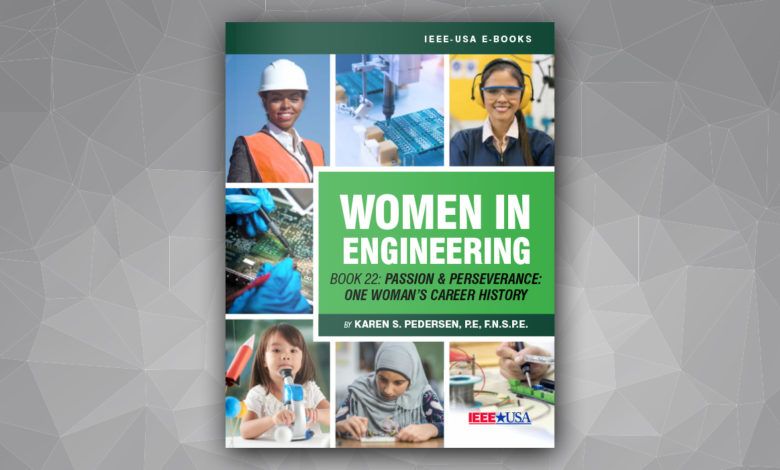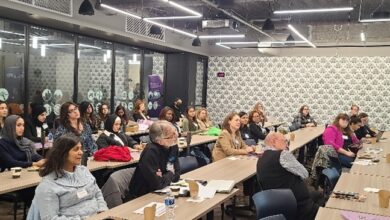
Karen S. Pedersen is proof that it is never too late to get your engineering degree. In fact, waiting some years can be the best path.
This IEEE Senior Member – who was the 2017 IEEE-USA President, as well as a Fellow in the National Society of Professional Engineers (NSPE), and a licensed P.E. in three states – graduated from Iowa State University 17 years after receiving her high school diploma.
Now a consultant, after more than 40 years with Iowa and Massachusetts utility companies, she relates her inspiring story about achieving both her engineering education and her professional dreams in Women in Engineering: Book 22 -Passion & Perseverance: One Woman’s Career History. It is the latest volume in the award-winning IEEE-USA Women in Engineering (WIE) e-book series. Beginning 1 October, WIE 22 is available from the IEEE-USA Shop for $7.99 for members and $9.99 for non-members.
Except for the first volume, an overview of STEM occupations, each e-book is the personally written account of how a notable woman technologist became interested in technology, obtained her education, and developed a successful and satisfying career. This year marks the sixth year of the landmark e-book series, which has been praised by educators and women’s organizations and honored with numerous publishing industry awards.
Georgia Stelluto, IEEE-USA Publishing Manager, and Manager/Editor, IEEE-USA E-BOOKS, says the series offers a diverse cross-section of backgrounds and technological professions. “Each author relates a distinctive, exciting story,” she said.
“Some say I lost 12 career years,” notes Pedersen as she reflects on her late start to obtain an undergraduate degree. “But to me, I gained the option of being an engineer.”
Pedersen explains how, after graduating from a Des Moines, Iowa, high school in 1961, she was working as an actuarial clerk to save money for the college she wanted to attend, when she met and married her husband. Two children soon followed. “For the next few years, I was occupied with bringing up the children, and following my husband’s career,” she writes.
But some years and several long-distance moves (dictated by her spouse’s employer) later, Pedersen found herself back in Des Moines — with both youngsters in elementary school, and enough free time to resume her studies. While in high school, she had discovered both her aptitude and enjoyment of mathematics, so for the next three years she earned an Associate degree in Mathematics.
“The problem,” she writes, “was what to do next. I didn’t want to teach math, and I didn’t want to be a researcher in mathematics. I wanted to use math.”
Richard Simpson, who had been her physics professor, encouraged Pedersen to enroll in two summer courses in electrical engineering at Iowa State University. There, she discovered not only a field in which to use her math talents, but also, a profession she loved.
Simpson is one of three mentors, all men, whom she credits for critical guidance at important points in her career. Starting with the professor – who also gave her lab space to create a Heath kit battery charger and a radio to help her understand what she would be expected to know on the first day of class – the author also acknowledges two male managers. Glen Walkup, her manager at her first job at Iowa Power, helped her to make the transition from electronics to power systems. He also encouraged her to start work on a Master’s.
A few years later, when Pedersen moved to a different department, her new boss James Fleming convinced her of the importance of joining IEEE and NSPE. “He introduced me to the IEEE Central Iowa Section in Des Moines, and he volunteered me to help judge the scholarship applications that the Section supported,” she recalls in her e-book. “Influenced by him, I also took the exams to become a licensed Professional Engineer in Iowa.”
That all three of Pedersen’s mentors were men may come as a surprise to her readers. The author, who attended college and spent her early working years at a time when relatively few women were in engineering, writes candidly about her experiences with gender discrimination and sexual harassment.
She vividly summons up the unsavory memories of one employment interview, but adds she managed to ignore the situation, finished the interview and left. Despite a job offer and attractive salary, she promptly declined. Some years later, while working in a department where she was one of the few female engineers, she endured embarrassing situations that, in her words, “would be unheard of today.”
However, in another instance, Pedersen proudly admits to “blowing gender bias out of the water” — because of what she knew. Working in a virtually all-male department at Boston Edison, she suggested a program she had used at a previous job to solve a very difficult problem. After she presented the information during an all-hands, mostly male meeting, her plan to use the program was approved – and the topic changed to how everyone would do their part to make it successful.
Karen Pedersen calls volunteering her “other career” and she credits both IEEE and NSPE for enabling her to develop her leadership skills. As 2017 IEEE-USA President, she is proudest of the two ad hoc committees she established to study two important needs and develop a plan. The first is a budget that reflects what matters to members – representing them well in Washington, D.C., and providing career resources. The second committee, on diversity, reflects Pedersen’s concern with increasing the number of women and minorities in engineering.
“Women in electrical engineering will not achieve equality until average female students are accepted in universities and are employed in the same numbers as average men,” she concludes.
All previous e-books in the WIE series are also available at https://ieeeusa.org/shop and are also priced at $7.99 for IEEE members and $9.99 for non-members.
Helen Horwitz is an award-winning freelance writer who lives in Albuquerque, N.M. She was with IEEE from 1991 through 2011, the first nine as Staff Director, IEEE Corporate Communications.






